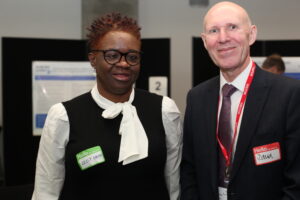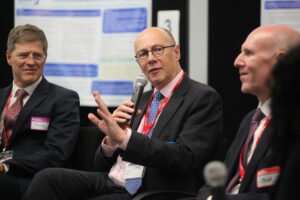NHS England’s National Medical Director Explores South East London’s Effective Approach to Addressing Overprescribing
NHS England’s National Medical Director, Sir Stephen Powis, learned about the local NHS’s approach to tackling overprescribing on a recent visit to the South East London Integrated Care Board (SEL ICB).
Overprescribing is a complex problem where people are given medicines they don’t need or want, or where harm outweighs benefits. Often there is a better alternative, which is not a medicine.
Overprescribing can have detrimental effects on patients. A person taking 10 or more medicines for instance is 300% more likely to be admitted to hospital because of an adverse drug reaction. Therefore, tackling overprescribing leads to a better quality of care for patients and can save money if inappropriate prescriptions are stopped.
Dr Toby Garrood, Joint Medical Director for the South East London Integrated Care Board, said:
“It was a pleasure to host the most senior representatives from NHS England in south east London to show them the cross-system working taking place to combat overprescribing.
“Addressing overprescribing is crucial to ensuring that people throughout south east London are able to live the healthiest lives possible.
“Thank you to all throughout the system who came to showcase their work, and for their continued
dedication combating overprescribing”.

Joined by Chief Pharmaceutical Officer, David Webb and National Clinical Director for Prescribing, Professor Tony Avery, the NHS Medical Director visited North Wood Group Practice in Lambeth and heard first-hand from patients about why this work is important to them. Patients also explained how the overprescribing outreach programme has helped them discover alternatives, which are not medicines, to managing their health conditions.
On the day, local resident Jackie Jones, who has multiple long-term health conditions that cause her chronic pain, talked about how finding non-medical solutions to managing her pain has helped with her overall wellbeing. From massage to aromatherapy and heat pads, Jackie has been trialling suggestions from pharmacists and from her chronic pain group at the North Wood GP Surgery. She said:
“I used to think I always needed pills and medication. Now, I’ve lessened the amount I take and I’m finding other ways. Sometimes these help with the pain and other times they don’t, but all in all, [these techniques] have been helpful.”
During the visit, professionals from across the NHS, including doctors, pharmacists, and engagement teams, joined to talk about the benefits of taking a multidisciplinary approach and sharing their expertise to address the challenge of overprescribing.

The visit also featured a ‘fishbowl’ style conversation with the NHS England representatives, South East London overprescribing leads and people with lived experience, discussing various aspects of overprescribing, from personal experiences to challenges within the healthcare system and potential ways to resolve these.
Lelly Oboh, Overprescribing Lead Pharmacist for the South East London Integrated Care Board, said:
“It was great to facilitate open and candid conversations between some of the most senior NHS England representatives and some of the patients that they serve. Overprescribing is everyone’s business, and it’s important to hear from everybody that is impacted by it to understand what we can do to improve outcomes in the long-term.
“As a consultant pharmacist, overprescribing is something I am very passionate about and I’m proud of the steady but promising progress that we have made to address it so far. Thank you to our visitors for taking the time to learn about the work we are doing here in south east London.”
 There are multiple factors that lead to overprescribing. The South East London Overprescribing Project seeks to address them by acknowledging existing weaknesses in the prescribing system, working with clinicians to challenge the behaviours that create a culture of overprescribing, and engaging with patients to understand their experiences.
There are multiple factors that lead to overprescribing. The South East London Overprescribing Project seeks to address them by acknowledging existing weaknesses in the prescribing system, working with clinicians to challenge the behaviours that create a culture of overprescribing, and engaging with patients to understand their experiences.
The programme has achieved the following to date:
- Developed a clear action plan, including creating good working relationships with other programme boards and committees as well as Local Care Partnerships to deliver relevant aspects of the plan.
- Built on the learning from successful local or national initiatives to develop and implement high impact evidence-based interventions to reduce overprescribing.
- Developed metrics and performance monitoring to track our progress.
- Undertaken a significant programme of patient and public engagement to inform and drive our overprescribing programme.
The South East London Overprescribing Project’s work reflects the National Overprescribing Review recommendations and supports NHS England’s work to implement these by using best practice approaches to improve patient care
